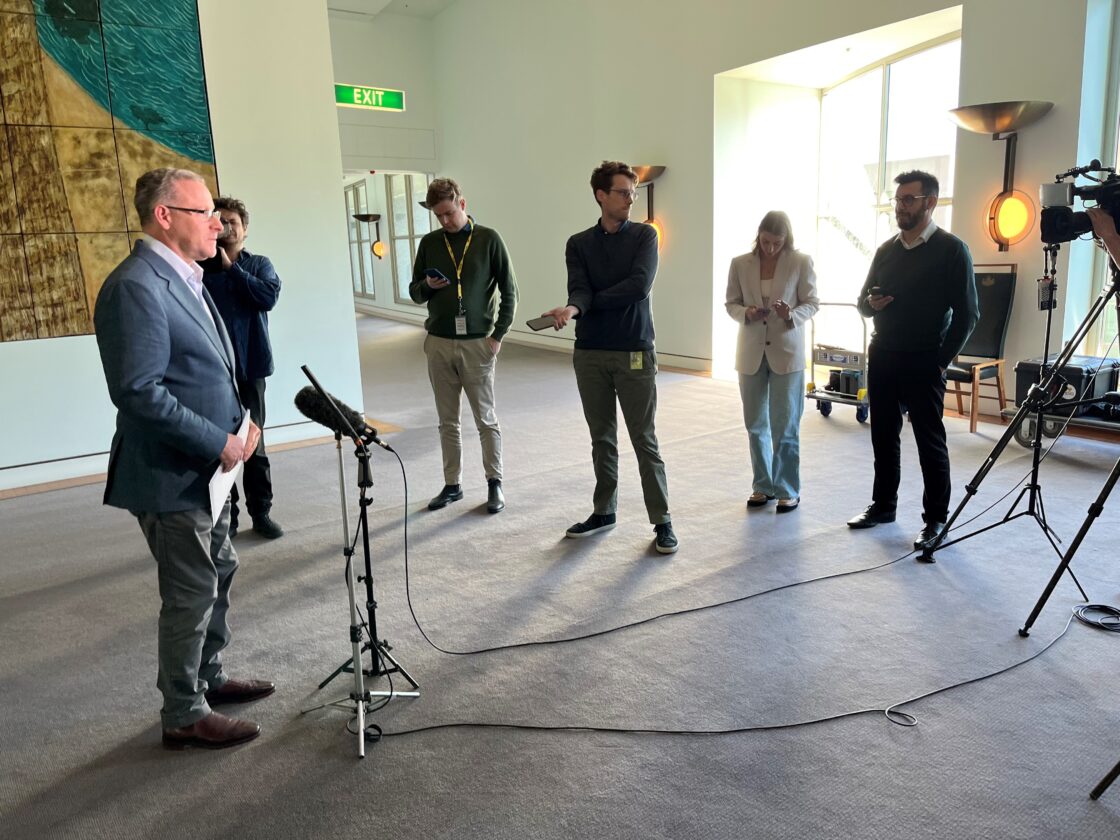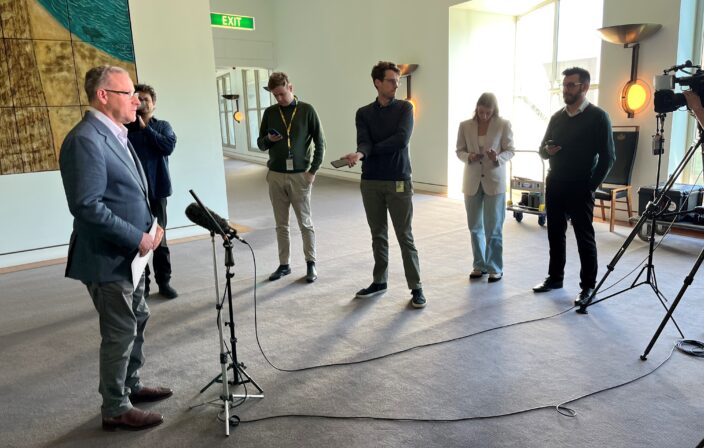ACCI launches 2024 Small Business Conditions Survey
22 Jul 2024
|Transcripts

Event: ACCI chief executive officer Andrew McKellar launches 2024 Small Business Conditions survey at Parliament House, Canberra
Date: Sunday 21 July 2024
Topics: 2024 Small Business Conditions survey, CrowdStrike and CFMEU;
E&OE
Andrew McKellar:
We are launching our Small Business Conditions survey today. It’s a very powerful survey and I think it has some very important findings in relation to the conditions that small business are struggling with in the Australian economy at the moment. So in particular, what the survey shows is that the impact of red tape regulation compliance has been growing significantly for small businesses in the past 12 months. In fact, in that period of time, 45% of small businesses said that they had considered closing their business as a result of the difficult trading conditions that they’re facing, and as a result of the red tape burden that they have to struggle with in regional and remote areas, that was even higher. 57% of businesses in regional and remote areas said they had considered closing their doors. Now, if that was to occur, that’s something that would impact over 1 million small businesses in Australia employing around 2 million people. So that’s a very significant far-reaching finding. 82% of small businesses said that they were encountering a major or moderate impact from compliance obligations in the past 12 months. 61% of small businesses said that that burden had increased in the past 12 months. So I think these are alarming findings. They show that in many cases, small business faces really a dire set of circumstances. They’re struggling to cope with it, and we need to get a better balance for small business in Australia. I’ll take any questions.
Journalist:
What does that balance look like?
Andrew McKellar:
Well, we’ve got to get to a situation where small business is able to get through that administrative burden much more effectively. What we’ve seen in the past 12 months, in particular in areas like industrial relations law, this has been changed to make it much harder for small business to create jobs and to employ people to take on new casual employees to deal with independent contractors, new definitions of employment, things like ‘Right to Disconnect’ law, all of these things small businesses grappling with, they find it confusing. Many of them don’t understand why those new regulations are there and why we have different definitions of small business in even a single act like the Fair Work Act, there are two different definitions of small business. So we’ve got to overcome those sorts of hurdles. We’ve got to make it easier for people to run their own small business in this country.
Journalist:
We know obviously there are increasing costs businesses are facing at the moment. Would Friday’s outage have been the final nail in the coffin for any?
Andrew McKellar:
Look, obviously it’s something that’s had a major impact. There’s been inconvenience there for customers, for small businesses, for business more generally. So payment systems have been affected. That’s obviously a very undesirable situation. What I would say in relation to Friday’s outage is that that impact, it was very regrettable in the circumstances. It’s unfortunately unavoidable, at least it is not the result of a security hack or a compromised security system. It’s part of the unfortunate reality of working in a very connected economy. The other thing I just say in relation to Friday is I do compliment the way that the government, the way that officials have responded to this. So the government stood up the national coordination mechanism very quickly. They have had three meetings since then, and I think that’s meant that across the economy, most areas of business have been able to get information about what’s been behind that. CrowdStrike have been involved in that process and advising all sectors about the action that they’ve been taken to remediate that. So I think that’s been prompt and I don’t think we could have asked for much more in the circumstances.
Journalist:
Do you have members given any indication of the dollar amount in terms of the CrowdStrike incident?
Andrew McKellar:
Look, very hard to say. I mean obviously there were a wide range of businesses that were affected as supermarkets, our airlines, petrol stations, retail outlets, financial service providers, the banking sector, payments system. So across the board there’s been a wide impact. There’s no doubt that’s cost a lot of businesses, time, money, lost sales. It’s been inconvenient for consumers. It’s been inconvenient for travelers. So look, it’s very hard to put a dollar figure on that. Those losses will be there. In the circumstances I think there’s been a concerted effort to get systems back up and running as quickly as possible. So I think from that point of view, business is at least grateful for that effort
Journalist:
If you can’t put a dollar figure on it. How would you characterise the losses are they not significant?
Andrew McKellar:
Oh look, I think that they are material, they’re significant. We have to hope that most businesses can weather that sort of impact over a one, two, three day period. Its timing couldn’t have been worse on a Friday and in particular, impacting on a Friday afternoon. It’s meant for many businesses, they have to wait until early next week to put in place the fixes that they need to do. But obviously that’s very inconvenient.
Journalist:
Does this reinforce concerns that businesses, if they need to IT system up and running, there’s only really a few key players that they can pick from and where they choose to go and get all their systems set up, and if that crashes, there’s so many flow on effects there. Is this a concern that you regularly hear from people or is this kind of reinforce that there are issues on that one?
Andrew McKellar:
Well, it does highlight that there are inbuilt vulnerabilities in the system, and I think when these major service providers are putting out an upgrade in their software, a new version, testing that before it’s put out into the market really is something that needs to occur. So there are going to be lessons coming out of this. I think lessons across the board from a commercial point of view for the IT suppliers for industry more generally in terms of how we try and build those safeguards into the system. For many of the users, there’s not a lot they can do. We do have those vulnerabilities and we really are looking for the suppliers for the IT industry to minimise this risk for the future as much as possible.
Journalist:
In terms of conditions. In terms of conditions of the use, the user’s agreement with CrowdStrike means it’s unlikely that many of these businesses are going to be able to seek redress through that. Obviously there is business continuity insurance. What’s your message to insurance companies in terms of trying to make people (indecipherable) quickly as possible?
Andrew McKellar:
Well, I think it’s an important reminder for business that insurance is a very important part of managing risk in your business. So I think here the insurance sector does play a vital service in that regard, and I think here reminding people that insurance, if you incur a cost, having that protection there can be an important part of overcoming the impact of the cost. Particularly if you are looking at those sort of business continuity issues, having a plan in place when those unexpected circumstances impact, you can’t control ’em. We don’t know where they’re coming from. It’s a world where there are increased levels of interconnectedness and there are layered levels of risk as well. So I think that’s why keeping an awareness of all the options that we have, including insurance, is very important for business and for small business.
Journalist:
The problem though is that if you’ve got a situation where an insurance company says, oh yeah, we’ll figure it out and it’s three or four months down the track, that’s a cashflow issue for many companies. Do you want to see insurance companies getting onto this quick and paying out as quick as possible?
Andrew McKellar:
Oh look, obviously we hope that the insurance companies will honour their contractual obligations in a smooth and timely way. And look, we have a very good dialogue with the insurance council. I think insurance companies are very mindful of those things, so that’s something we’ll work through with them in a very smooth and effective way.
Journalist:
Just following on from Ron’s question, do you think businesses should be entitled to compensation for this outage?
Andrew McKellar:
That’s difficult to say. I mean, I think it goes back to the issue of what contractual arrangements are in place with different suppliers. This is not a circumstance that’s been brought about by somebody hacking the system or a breach of security. It’s obviously something that’s quite unintentional. There are lessons that come out of it. I think for many businesses it’s going to be very difficult to secure direct compensation, but obviously that’s something that should be looked at and I think if there are ways to consider how that might be evaluated, then obviously that’s something that should be on the table.
Journalist:
Sorry, just on that then, in between now and until we know whether or not compensation’s an option, what should businesses, particularly small businesses who have lost money, should they go back over and check what they have covered in their insurance? Is that worth, what should they do? What’s your advice?
Andrew McKellar:
Well look, I think here, yeah, absolutely. I mean, and it is a reminder, regrettably, for a lot of businesses, this is going to be water under the bridge. It’s going to be a learning experience. I do think every effort has been undertaken to ensure that business is well-informed about the circumstances and obviously to work to get in place the patches and to upgrade systems, restore systems as quickly as possible.
Journalist:
We saw a Senate inquiry after the Optus outage. Do you think a similar investigation in Parliament would be worthwhile into this incident?
Andrew McKellar:
Look, I’m not sure whether that is the appropriate course of action. I think here working with the central agencies, working with home affairs, working through the national coordination mechanism, working through the cyber council that the government has set up. It’s not just security issues that pose a risk in the modern economy. It is these other unintended outages as well that are also at risk. So I think taking the opportunity to really learn the lessons, that’s going to be absolutely fundamental for business. And are there any questions on the survey? Happy to answer those as well. One more
Journalist:
Quickly on CFMEU. I’m very sorry. Are you at all concerned about the response from some state branches to CFMEU? It looks like they’re going to fight tooth and nail against any administrators being put in place. What’s your response to that?
Andrew McKellar:
Very good question, Ron. No, look, this is an absolutely serious issue. It is worrying to see that elements of the CFMEU of the construction division may contest the application for an administrator to be appointed. From our point of view, that is just one step appointing an administrator. We need to see the full details of that. I think the public has to have confidence in the solutions that are being sought to be implemented here. It’s not clear that simply the appointment of an administrator will go far enough. Those divisions of the union that wish to demerge, that wish to get away from the taint of the construction division, they need to be able to do that. Deregistration needs to still be on the table at the appropriate point in time. We have to have a regulator that has the independence and the resources to really get to the bottom of what’s been happening in the construction industry to clean that out, to enforce the standards in the future.
So there’s a number of steps here. I think business is really concerned still that we don’t have all of the solutions. There needs to be a strong commitment from the federal government, from state governments, territory governments to root out the corruption that’s been going on in this sector to take firm action and ensure that there is strong enforcement of standards in the future. We’re not in that situation at the moment and we don’t have confidence that we are going to get there in the short term without additional measures to those that are already on the table.
Journalist:
Just want to ask about the sample size of the survey. It was about 400 businesses. Is that really representative and can you be definitive to say that all of these businesses that are considering closure, it’s all because of red tape we’ve had pretty challenging times….
Andrew McKellar:
Sure. Yeah. Look, that’s the number of respondents that we’ve had. We think that’s a good number. Obviously we’d like to get more. This is the first time we’ve run this particular survey. We’ve gone out to a broad network. We’ve used our statement and territory, chamber network. I think it’s a measure of the fact that for many small businesses, they simply just don’t have the time. So we’re asking them to give more of their time to respond to things like this. And many of them are happy to do that because I think the findings of the research are very important. So we’re comfortable. This is a very good and representative sample of respondents that we’ve got. Yes.
Journalist:
The Reserve Bank and the Treasurer are talking about a narrow path, the economy bringing inflation down, the jobs market’s holding fairly stable unemployment coming down slowly, but are they forgetting small business in their narrow path? We’re seeing demand and people’s disposable income shrink and vanish completely.
Andrew McKellar:
Yeah. We’re walking a tightrope, conditions for small business remain precarious. They’ve struggled with higher input costs. They’ve struggled with getting the labour and the skills that they need. The labour market has been surprisingly strong. That’s a great thing. But interest rates have done their work. They’ve had an impact on the economy. The next step we need to get to is to start to see interest rates coming down. The best way to take the pressure off the cost of living and the cost of doing business is to start to reduce interest rates. So that’s why we need to see inflation coming down, getting back into that target range for the Reserve Bank and seeing the Reserve Bank get to the position where it has the confidence to start reducing interest rates. So the sooner that can happen, the better it will be for the Australian economy.
Journalist:
Just on CrowdStrike from seeing of the major companies, Woolies et cetera. Their issues are now their overall generally fixed. What about the small business? Does it linger for small business? Will it be not just Monday or Tuesday they’ll be back to normal?
Andrew McKellar:
Look, we hope so I mean the solutions are out there. They’re accessible. They are being provided by CrowdStrike. So of course for small businesses, depending on how many devices you have, what systems you’re running. I think the biggest impact for most small businesses was things like the loss of their payments systems, their connections to their banking, finance, and finance operations. So hopefully that’s where it will stop for most of those businesses. Of course, there’ll be some that will take another couple of days to implement the patches themselves.
Journalist:
And just also with the compensation element. You said it’s difficult because there’s not been a hack. Is that the sole reason or are there other factors it’s going to be difficult to issue compensation?
Andrew McKellar:
Well, I think it comes back to how do you shoot back the fault for something like this? Obviously this is something that is coming from one particular supplier. What are the contractual arrangements you have in place with the suppliers? Obviously if there is damage, it’s something that some businesses should look at, but that can be a difficult path. Now, whether or not there is grounds there for some sort of class action or not, that remains to be seen. I think we’ll leave that in the hands of the lawyers and the creative minds in that area. I think at this stage, most businesses, most small businesses are simply focused on what they need to do to make sure that their systems are working, that they’re able to service their customers, that they’re able to accept payments and they’re able to get back up and running. That’s the priority. Okay. Thank you all. Thanks very much for coming out on a Sunday morning.
For more information:
Craig Sullivan| Media Advisor
P | 02 6270 8020
E | media@acci.com.au


